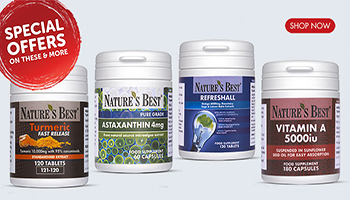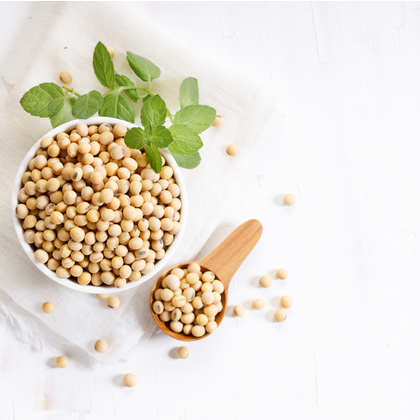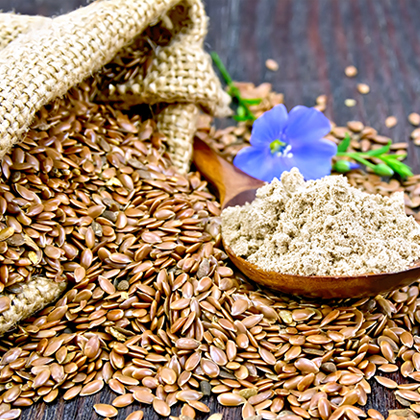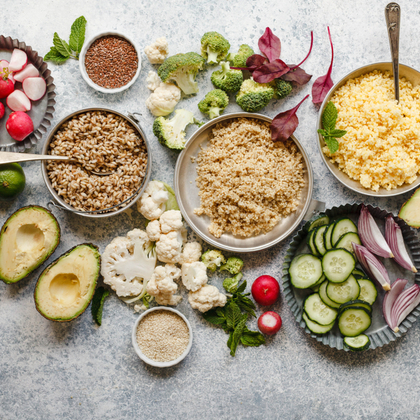
Hormone replacement therapy (HRT) is widely used to treat a number of menopausal symptoms. It works by delivering synthetic oestrogen and progesterone — hormones that gradually decline in menopause.
Although it is effective for most women, not every woman chooses HRT or can have HRT to help their symptoms of the menopause, due to personal preference or previous medical history. For this reason, some women turn to natural remedies such as dietary changes,complementary medicine, or supplementation, although it’s not always clear if these alternative therapies are truly effective. Below we’ll explore a range of HRT alternatives to help you decide on the best option for you.
How can I control menopause without HRT?
Add more phytoestrogens into your diet
Phytoestrogens contain compounds that bind with oestrogen receptors in cell membranes, causing oestrogenic effects in the body (1). By imitating oestrogen, these foods may help to balance hormones throughout menopause, thereby supporting the reduction of menopausal symptoms (2). Interestingly, in Asian populations where the diet is especially rich in soy, women rarely experience hot flushes and other menopausal symptoms (3).
 Increasing your daily intake of phytoestrogens is a simple way to support your wellbeing in menopause. Tofu, tempeh, miso, linseeds, sesame seeds, pumpkins seeds, soya milk, celery, green beans, and rhubarb are rich sources of phytoestrogens.
Increasing your daily intake of phytoestrogens is a simple way to support your wellbeing in menopause. Tofu, tempeh, miso, linseeds, sesame seeds, pumpkins seeds, soya milk, celery, green beans, and rhubarb are rich sources of phytoestrogens.
Consume more bone-supporting nutrients
As you progress through perimenopause – the years leading up to menopause – your levels of circulating oestrogen start to decline, albeit unevenly. Besides supporting cardiovascular health and sleep hygiene, oestrogen is also a bone-protective hormone. The sharp drop in oestrogen, therefore, may compromise bone health and increase the risk of osteoporosis. Many women are prescribed HRT as a buffer against osteoporosis, especially if they’ve experienced early menopause. However, healthy bones need more than just oestrogen.
To support bone health throughout menopause, we highly recommend eating foods rich in calcium, vitamin D, and magnesium — all of which are vital for maintaining the integrity of your bones (4). Oily fish, liver, and egg yolks are also rich in vitamin D, while green leafy vegetables, dairy products, tofu, and nuts are high in calcium. You can find magnesium in whole grains, nuts, seeds, and dark chocolate.
Aside from increasing your dietary intake of calcium, vitamin D, and magnesium, you may also want to consider taking a quality multivitamin designed for bone health as an insurance policy. Look for a formula that delivers at least 10µg vitamin D, 90µg vitamin K, 500mg calcium, and 250mg magnesium, like Osteoguard® Ultra.
Increase your intake of healthy fats
Ensuring a plentiful intake of omega-3 fatty acids is also critical throughout menopause. Abundant in oily fish, the omega-3 fatty acids, eicosapentaenoic acid (EPA) and docosahexaenoic acid (DHA), may help to ease specific menopausal symptoms, such as hot flushes and low mood (5).
To support your overall health in menopause, aim for 2-3 portions of oily fish (salmon, herrings, anchovies, sardines) every week. To plug any nutritional gaps, you may consider taking a high-strength fish oil supplement that delivers 1100mg – 1300mg. Sea Buckthorn Berry Oil, omega 7, has also demonstrated promise in supporting the reduction of intimate dryness, which commonly affects menopausal women (6).
What is the best natural hormone replacement for menopause?
St John’s Wort
St John’s Wort is a traditional herbal medicinal product used to relieve the symptoms of slightly low mood and mild anxiety. As such, St John’s Wort has become a popular choice to support the mood changes associated with menopause.
In one study, postmenopausal women experiencing low mood, decreased libido, and physical exhaustion took St John’s Wort for three months (7). Sixty per cent reported an increase in libido, while 82 per cent observed in reduction in anxiety, low mood, irritability, sweating, hot flushes, and insomnia.
It’s important to note, however, that St John’s Wort may interact with some medications, namely antidepressants, contraceptives, and sleeping pills. Always check with your GP before taking this herbal remedy. Look for a formula that contains 370mg of extract, equivalent to 1,850mg-2,590mg of St John's Wort.
Soya Isoflavones
Besides increasing your intake of phytoestrogens, you may also want to consider supplementing with soya isoflavones. Thanks to their oestrogenic effect in the body, empirical evidence purports soya isoflavones may ease menopausal symptoms (8).
In a meta-analysis of 19 studies, researchers reported that soya isoflavones reduced the severity of hot flushes by 26 per cent, compared to the control (9).
There’s also some data indicating that soya isoflavones may support bone health. Since oestrogen serves a bone protective role in the body, soy isoflavones may help to preserve bone health and reduce to risk of developing osteoporosis in postmenopause (10). We recommend taking 50-100mg of soya isoflavones daily to support your health throughout menopause.
Sage
As a member of the phytoestrogen family, sage has become a popular supplement for the menopause, especially amongst those looking for a soya-free option. Although the health benefits of sage haven’t been widely studied yet, smaller investigations are promising. In 2011, researchers assessed the tolerability and efficacy of sage on the severity of hot flushes on 71 menopausal women across eight treatment centres throughout Switzerland (11). Remarkably, the incidences and severity of hot flushes decreased every week.
It’s always necessary to speak to your GP before taking any preparation of sage, particularly if you take medication for high or low blood pressure or diabetes. We suggest looking for a formula that delivers 2,500mg of sage, as 500mg extract.
Before you begin taking supplements, or making any changes or to your current medical treatment, it’s always best to speak to your GP, as they can guide you on the right options for you. For more advice on supporting your health in menopause, simply visit the rest of our Menopause hub.
References:
-
Rietiens. I, Louisse. J, Beekmann. K. The potential health effects of dietary phytoestrogens. British journal of pharmacology. 2017;174(11):1263-1280.
-
Howes. LG, Howes. JB, Knight. DC. Isoflavone therapy for menopausal flushes: a systematic review and meta?analysis. Maturitas. 2006;55:203-211.
-
Zhang XL. et al., Soy food consumption is associated with lower risk of coronary heart disease in Chinese women. J Nutr. 2003;133:2874-2878.
-
Rizzoli R.Dairy products, yogurts, and bone health. The American Journal of Clinical Nutrition. 2014;99(5):1256S-1262S.
-
Larmo P. et al., Effects of sea buckthorn oil intake on vaginal atrophy in postmenopausal women: A randomized, double-blind, placebo-controlled study. Maturitas. 2014;79(3):316-321.
-
Grube. B, Walper A, Wheatley. D. St John's Wort extract: efficacy for menopausal symptoms of psychological origin. Adv Ther. 1999;16:4.
-
Bacciottini L. et al., Phytoestrogens: food or drug? Clinical cases in mineral and bone metabolism : the official journal of the Italian Society of Osteoporosis, Mineral Metabolism, and Skeletal Diseases. 2007;42(2):123-130.
-
Taku K. et al., Extracted or synthesized soybean isoflavones reduce menopausal hot flash frequency and severity. Menopause: The Journal of The North American Menopause Society. 2012;19(7):776-790.
-
Arimandi B. et al., Soy Protein Has a Greater Effect on Bone in Postmenopausal Women Not on Hormone Replacement Therapy, as Evidenced by Reducing Bone Resorption and Urinary Calcium Excretion. The Journal of Clinical Endocrinology & Metabolism. 2003;88(3):1048-1054.
-
Bommer. S, Klein. P, Suter. A. First time proof of sage’s tolerability and efficacy in menopausal women with hot flushes. Advances in Therapy. 2011;28(6):490-500.
Disclaimer: The information presented by Nature's Best is for informational purposes only. It is based on scientific studies (human, animal, or in vitro), clinical experience, or traditional usage as cited in each article. The results reported may not necessarily occur in all individuals. Self-treatment is not recommended for life-threatening conditions that require medical treatment under a doctor's care. For many of the conditions discussed, treatment with prescription or over the counter medication is also available. Consult your doctor, practitioner, and/or pharmacist for any health problem and before using any supplements or before making any changes in prescribed medications.
Related Posts

Olivia
Olivia Salter has always been an avid health nut. After graduating from the University of Bristol, she began working for a nutritional consultancy where she discovered her passion for all things wellness-related. There, she executed much of the company’s content marketing strategy and found her niche in health writing, publishing articles in Women’s Health, Mind Body Green, Thrive and Psychologies.
View More



